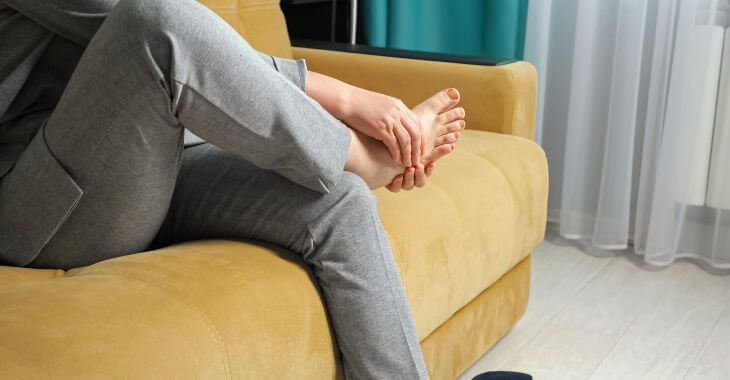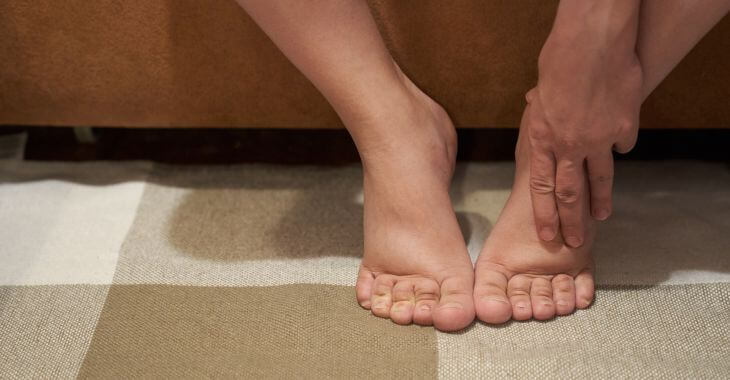What Causes Swollen Legs from the Knee Down?

Lower leg swelling can occur for a variety of reasons. The lower legs are the most susceptible to retaining water and other fluids due to their position, but if the circulatory system is working correctly, no swelling should occur. What causes swollen legs from the knee down? There are a few possible answers.
Leg swelling is referred to as peripheral edema and usually occurs in the lower legs. Some people may only have fluid accumulate around their ankles, but others may have swelling from the knees down. There are a variety of factors that can contribute to lower leg swelling and various treatments for relief.
Who Is at Higher Risk for Peripheral Edema?
There are a variety of lifestyle and health factors that can increase your risk for lower leg swelling. Most of these concerns affect fluid retention in the lower legs, making it hard for the body to regulate fluids. For those experiencing puffy, painful ankles, feet or calves, the following may contribute:
- Obesity. One of the biggest factors in lower leg swelling is excess weight. Those who are overweight or obese are at much higher risk of peripheral edema.
- Standing/Sitting. If you spend all day sitting or standing, both can lead to swelling in the lower leg.
- Too much salt. Eating a high-sodium diet can contribute to fluid retention in the body, including in the lower legs.
- Medications. Some medications can cause fluid retention and may contribute to the lower leg swelling. If severe swelling occurs, changing medications may be needed.
- Systemic diseases. When your heart, kidneys, thyroid, pancreas or other organs are not working correctly, it can impact fluids and blood in your body. Those with health conditions that affect these organs may experience frequent leg swelling.
- Protein intake. Those who do not eat enough protein in their diet can be more susceptible to lower leg swelling.
- Health conditions. Varicose veins, diabetes, arthritis and other health issues can result in swollen ankles, calves and feet. Managing health conditions or seeking treatment can reduce episodes of leg swelling.
- Traveling. Many people experience swollen ankles, calves and feet when flying or traveling. This can be a combination of sitting for prolong periods, cabin pressure in airplanes and health conditions.
Those who are at higher risk for swelling in the lower legs can reduce their episodes by managing certain lifestyle factors. Varying activities, losing weight, changing diet and managing health conditions can all help reduce the frequency of swollen lower legs.
When to See a Doctor for Swollen Lower Legs
Many people will experience fluid retention or inflammation in the lower legs occasionally, but it usually will dissipate overnight or within a day or two. However, there are times when lower leg swelling can be a sign of more serious health conditions and may require medical treatment.
When looking at what causes swollen legs from the knee down, there are a few critical medical conditions that could be responsible. If you have certain accompanying symptoms with lower leg swelling, you may need to see a doctor.
- Deep Vein Thrombosis (DVT)
- DVT is a serious condition where a blood clot forms in a large vein, often in the lower leg. This blood clot can break loose and enter the heart or lungs, causing an embolism which may be life threatening.
- If you have swelling in a lower leg with pain, redness and warmth, you should see a doctor immediately, especially if you have chest pain or trouble breathing.
- Heart Failure
- Those with heart failure are more prone to fluid retention, but swelling in the lower legs should be reported. Individuals with heart failure can manage their disease with lifestyle and medication but swelling in the legs can be a sign their heart condition has worsened.
- Injuries
- If you have bruising and pain combined with swelling in the lower leg, ankle or foot, you may have a fracture, sprain, strain or other injury. Seek medical attention for diagnosis and treatment.
Treatment for Lower Leg Swelling
There are many possible treatments for swollen lower legs, from lifestyle changes to medical treatment. For occasional swelling, wearing compression socks, varying your activities, elevating the legs and drinking enough fluids may offer relief.
For those with underlying conditions that cause swelling from the knee down, it may be time to discuss these symptoms with their doctor. There may be treatments, exercises, medications or diet changes that can reduce inflammation and fluid retention in the lower legs to give you relief from this issue.

Most people experience swelling in the lower legs occasionally, which is not usually a serious health concern. But when researching what causes swollen legs from the knee down, there are possible serious medical issues. If you have accompanying symptoms with leg swelling, you should seek medical attention.
The information provided on this website, including text, graphics, images, and other materials, is intended solely for informational purposes and should not be used as a substitute for professional medical advice, diagnosis, or treatment.


)